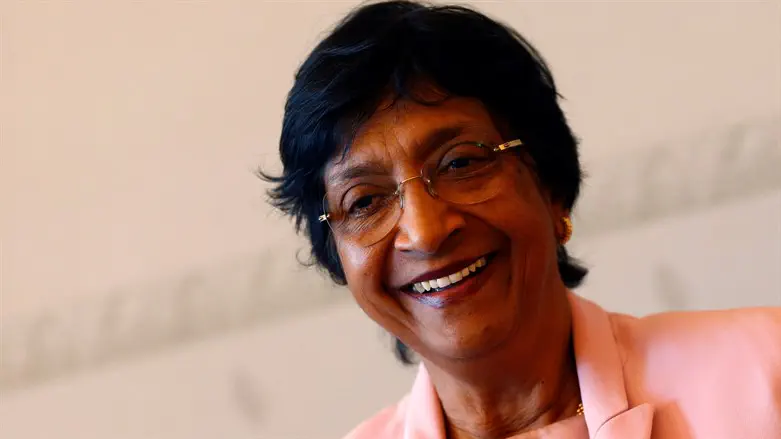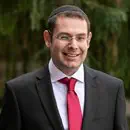
The heads of the Commission of Inquiry established by the United Nations Human Rights Council to investigate alleged Israeli war crimes stated that Israel may not be able to claim the right to self-defense against Hamas in the aftermath of Hamas' massacre of over 1,400 Israelis on October 7.
Chris Sidoti, the commissioner of the Independent International Commission of Inquiry on the Occupied Palestinian Territory, including East Jerusalem, and Israel, the open-ended investigation against Israel established by the Human Rights Council in 2021, made the remarks during a press briefing yesterday (Wednesday).
Sidoti stated that "one difficulty that it seems is not being properly addressed in discussing the right to self-defense in those terms, under Article 51 of the UN Charter, is that that’s predominantly framed in terms of an attack by another state upon the first state and defending against state action."
According to him, because Israel does not recognize the State of Palestine, "it may be for that reason that the State of Israel cannot claim to act under Article 51 when it is being attacked not by a state, but by a non-state actor."
He added: "There was discussion in the ICJ advisory opinion on the wall in 2004 in which the ICJ addressed not the situation of Gaza, but the situation of the West Bank and said that the right to self-defense did not arise there because the West Bank was under tight Israeli occupation and it could not be considered as being an attack by either a non-state actor as an armed group or by another state."
Sidoti did say that "the State of Israel has the obligation to defend its citizens," but stopped short of stating that the Jewish State has the right to defend itself.
"What happened on the 7th of October in the targeting of civilians, the killing of civilians, the taking of civilian hostages constituted war crimes," he said, but added that "the questions more broadly though are, why did it happen, how did it happen, what actually happened."
Navi Pillay, the chairwoman of the Commission of Inquiry, said that the commission would "examine issues such as the right of defense," but stated that Israel's response to the massacre is "much more retaliation and revenge."
Pillay claimed that currently, "there is no direct threat to individuals from Israel" since the Hamas invasion of southern Israel was fought back in the days following October 7, ignoring the thousands of rockets that have been fired at Israel every day since the massacre and the repeated attempts to infiltrate Israel again by smaller cells of terrorists.
Pillay also supported the controversial statement of UN Secretary-General Antonio Guterres, who has been accused of justifying the Hamas massacre when he claimed that the attack "did not happen in a vacuum" in a speech to the Security Council on Tuesday.
"The Secretary-General, in my view, made a correct statement," Pillay said. "We have all this verified evidence that the attack isn’t an isolated incident. It flows from all these violations, as well, on both sides, not just on the Israeli sides."
Sidoti added that "there was a place and there was a time in which these events occurred. And we have to take account of the place and the time. I think that’s what the Secretary-General was saying. Sounds fair enough to me."
Pillay accused Israel of war crimes directly, saying that "civilians are being targeted" and "they appear to be mowing down civilians."
She also accused Israel's treatment of the Palestinian Arabs of being worse than the treatment of native Africans under the Apartheid regime in South Africa when citing the use of violence as part of the campaign to bring down the Apartheid system. "I can’t compare that with Palestine, except the suffering here is so much worse, so much longer."
The statements of the Commission of Inquiry leaders were condemned by Professor Anne Bayefsky, Director of the Touro Institute on Human Rights and the Holocaust and President of Human Rights Voices, a human rights NGO that monitors the United Nations and the Human Rights Council.
"It is absolutely vital to recognize that this is a two-front war, one on the battlefield and one at the United Nations. Palestinian terrorists tied up and slaughtered Israelis in their homes. Palestinian diplomats – the representatives of Hamas on the global stage – use the UN to tie up Israel and attempt to deny its right of self-defense in the corridors of political power," Prof. Bayefsky said.
"The UN Commission of Inquiry lays out the plan for Israel’s destruction very clearly. As early as October 10th, Navi Pillay released a press release characterizing the invasion of a UN member state and slaughter of its civilians as “the latest explosion of violence in Israel and Gaza.” Her "Inquiry" “underscore[d] the urgency for the parties involved to cease all forms of violence” in a kind of obscene analogy between pro-beheaders and anti-beheaders. The "Inquiry's" campaign to normalize Hamas, to humanize the inhumane, is an atrocity all its own - Sidoti telling the world’s press on Wednesday: “I’m assuming that Hamas and the government of Israel and the PLO are interested in truth.” Of course, "Inquiry" members lined up alongside the Secretary-General and his scandalous attempt to situate, to contextualize – to justify – the unjustifiable.
"We can plainly see from the “Inquiry’s” remarks to the world press that the logical conclusion of the terror apologists is more terror. They move seamlessly from blood libels, to relativism as between moral perverts and their victims, to a denial of the right of self-defense, to a greenlight for terror and so-called “armed struggle.” The moral bankruptcy of the United Nations is lethal. Exposing it, contradicting it, and withholding funds from it, are crucial elements in any plan to win this existential war," Bayefsky concluded.

